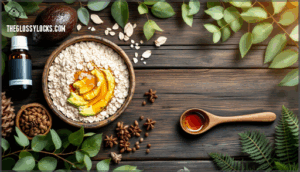This site is supported by our readers. We may earn a commission, at no cost to you, if you purchase through links.

Organic skin care methods offer a different approach: formulations built from ingredients that mirror your skin’s natural chemistry, working with your body’s existing mechanisms rather than overriding them. The shift toward certified organic ingredients isn’t just about avoiding harsh chemicals—it’s about harnessing plant compounds that deliver measurable benefits through pathways your skin already understands.
When you choose genuinely organic products and techniques, you’re tapping into centuries of botanical wisdom now validated by modern dermatological research.
Table Of Contents
- Key Takeaways
- What is Organic Skin Care?
- Key Ingredients in Organic Skin Care
- Creating an Organic Skin Care Routine
- DIY Organic Skin Care Methods
- Choosing Effective Organic Skin Care Products
- Frequently Asked Questions (FAQs)
- What ingredients should you look for in organic skin care products?
- What are the ways to get a fair skin?
- What are organic skincare products?
- Why should you choose organic skincare?
- What is a natural skin care routine?
- Where can I buy organic skincare?
- What is the best natural skin care routine?
- What is considered organic skincare?
- What are some good skin care methods?
- What are the 4 basics of skincare?
- Conclusion
Key Takeaways
- Your skin absorbs roughly 60% of what you apply to it, making organic skincare a biological conversation with your body rather than just a cosmetic ritual—certified organic products use ingredients that mirror your skin’s natural chemistry and work with existing mechanisms instead of overriding them.
- Genuine organic certification (like USDA Organic requiring 95% certified organic ingredients) protects you from greenwashing and ensures products are grown without synthetic pesticides, GMOs, or genetic modification—look for third-party verification rather than vague "natural" or "green" marketing claims.
- Plant-based ingredients like jojoba oil (which mimics human sebum), seabuckthorn (providing omega-7 fatty acids for wound healing), and non-nano zinc oxide for sun protection deliver measurable benefits through pathways your skin already understands, while conventional products often contain parabens, phthalates, and formaldehyde releasers linked to endocrine disruption and carcinogenic effects.
- Building an effective organic routine means layering products strategically—morning regimens prioritize antioxidant protection against environmental stress, while nighttime focuses on regenerative oils that support dermal restoration during your skin’s natural healing phase, with DIY options offering ingredient control at a fraction of retail costs.
What is Organic Skin Care?
When you hear "organic skin care," you might picture earthy creams in recycled jars—but there’s more to it than aesthetic appeal. Understanding what truly qualifies as organic helps you make informed choices that align with your skin’s needs and your values. Let’s break down the essential concepts that define this approach to beauty.
Definition and Principles of Organic Skin Care
Organic skin care draws on the same principles that govern USDA-certified organic agriculture—it’s about harnessing botanicals and naturally derived compounds grown without synthetic pesticides or genetic modification to nourish your skin while supporting ecological balance.
These USDA certified organic standards prioritize natural ingredients that deliver real skin benefits without compromising environmental health.
By choosing organic skincare and natural skin care methods, you’re embracing sustainable beauty that protects both your complexion and the planet—eco-friendly choices that reflect a deeper commitment to wellness.
Organic Vs. Natural Vs. Conventional Products
Understanding the distinctions between these categories matters for your skin’s health. Natural products contain nature-derived ingredients but may include chemically processed substances, while organic beauty products meet strict USDA certified organic standards—no synthetic pesticides, GMOs, or genetic modification allowed. Conventional products undergo rigorous quality control but often contain synthetics with long-term safety questions.
Market trends show 74% of consumers value organic ingredients, yet regulatory differences mean 80% of natural ingredients lack clinical testing. Consumer preferences increasingly favor organic skincare for reduced chemical exposure, though you’ll pay a premium for certified products. The growth of the organic skin care market is driven by increasing consumer awareness of natural ingredients.
Importance of Organic Certification Labels
With organic claims flooding the market, certification labels serve as your most reliable safeguard against misleading promises and empty marketing. The USDA organic seal guarantees products meet rigorous standards—certified organic ingredients grown without synthetic pesticides or GMOs.
Look for organic accreditation from legitimate bodies that verify sustainable practices through annual inspections. These label standards aren’t just eco-friendly badges; they’re your confirmation that the certification process demands real accountability, protecting you from greenwashing while supporting genuinely ethical sourcing.
Key Ingredients in Organic Skin Care
Organic skin care relies on carefully selected ingredients that work with your skin’s natural biology rather than against it. The foundation of effective organic formulations includes nutrient-rich plant oils, therapeutic extracts, and naturally derived compounds that nourish without synthetic additives.
Let’s explore the key ingredients you’ll want to recognize—and the ones you should steer clear of.
Popular Plant-Based Oils (Coconut, Jojoba, Argan)
Plant-based oils don’t just moisturize your skin—they work at the cellular level to restore barrier function, deliver antioxidants, and mimic your skin’s natural lipid composition in ways synthetic ingredients simply can’t replicate. Here’s what you need to know about three powerhouse natural skin care products:
- Jojoba oil absorbs rapidly because its molecular structure closely resembles human sebum, making it ideal for balancing oil production without clogging pores
- Coconut oil delivers medium-chain fatty acids that strengthen your moisture barrier, though you’ll want to patch-test if you’re acne-prone
- Argan provides vitamin E and essential fatty acids through cold-press oil extraction methods that preserve its antioxidant potency
These plant extracts offer natural oil remedies your skin recognizes and utilizes efficiently.
Beneficial Extracts and Butters (Seabuckthorn, Shea Butter)
While oils penetrate your skin’s surface layers, extracts and butters deliver concentrated phytonutrients and fatty acids that repair damaged tissue and lock in moisture for hours—clinical benefits you’ll actually see in the mirror.
Seabuckthorn oil brings omega-7 fatty acids that accelerate wound healing, while shea butter’s triterpenes reduce inflammation and bolster barrier repair.
These organic emollients function as natural moisturizers your skin absorbs over extended periods, creating lasting hydration from botanical extracts rather than synthetic compounds.
Ingredients to Avoid in Non-Organic Products
When synthetic ingredients replace botanical extracts, you’re exposing your dermis to compounds that disrupt barrier function and hormonal signaling. Here’s what your organic switch eliminates:
- Parabens – synthetic preservatives found in 60% of leave-on products, linked to endocrine disruption with infant exposure rates three times higher than adults.
- Phthalates – detected in 100% of surveyed perfumes, banned in EU cosmetics but still permitted domestically despite reproductive toxicity.
- Formaldehyde releasers – carcinogenic substances present in 20% of lotions, facing FDA prohibition by 2027.
- Oxybenzone – chemical sunscreen agent associated with hormonal interference and environmental harm in 70% of global formulations.
To minimize risks, consider avoiding products with harmful skin ingredients that can cause long-term damage.
Creating an Organic Skin Care Routine
Building an organic skin care routine doesn’t mean tossing everything at once—it’s about finding a rhythm that works with your skin’s natural balance. Whether you’re starting your day or winding down at night, the right sequence matters as much as the products themselves.
Let’s walk through how to structure a routine that protects, nourishes, and nurtures your skin around the clock.
Morning and Nighttime Organic Regimens
Your skin doesn’t follow the same rules at dawn and dusk—just as your body’s cellular repair mechanisms shift throughout the circadian cycle, so should your approach to organic skincare application and ingredient selection.
Morning skin care routines prioritize antioxidant-rich serums and lightweight botanical moisturizers that protect against environmental oxidative stress, while nighttime care focuses on regenerative oils and nutrient-dense formulations that support dermal restoration during sleep’s natural healing phase.
Gentle Cleansing and Exfoliation Methods
The mechanical friction of aggressive cleansing—whether from harsh surfactants or abrasive physical exfoliants—can compromise your skin’s lipid barrier faster than most environmental aggressors you’ll encounter throughout the day.
That’s why your gentle cleansing approach should incorporate enzyme-based natural scrubs or lactic acid gentle peels that promote skin renewal without mechanical trauma.
For your organic skincare routine, consider oil-based cleansers paired with facial massage techniques that boost lymphatic drainage while your skin exfoliation occurs through natural skincare ingredients like papaya enzymes rather than aggressive physical scrubbing.
Moisturizing With Organic Products
After cleansing and exfoliation have prepared your skin’s surface, replenishing moisture through organic formulations becomes the critical step that determines whether your barrier function thrives or deteriorates over the following hours.
Your organic hydration strategy should layer moisture retention through these evidence-based approaches:
- Apply organic serums with hyaluronic acid from plant sources to attract water molecules into your epidermis
- Layer natural emollients like jojoba or rosehip oil that mimic your skin’s sebum composition
- Seal moisture with organic products containing shea butter to prevent transepidermal water loss
This layering technique optimizes how moisturizers work within your natural skincare routine while strengthening your skin barrier.
Sun Protection Using Organic Ingredients
Ultraviolet radiation damages your skin’s DNA within minutes of exposure, yet conventional mineral sunscreens often contain nanoparticles that raise questions about long-term bioaccumulation—which is precisely why organic formulations use non-nano zinc oxide and titanium dioxide alongside botanicals that provide additional photoprotective benefits.
Your organic skincare line should include broad-spectrum natural sunblocks with at least SPF 30. Mineral sunscreens form a physical barrier on your skin’s surface, reflecting UV rays before damage occurs. Look for zinc protection combined with antioxidant-rich herbal shields like green tea extract or raspberry seed oil, which bolster facial sun protection through free radical neutralization.
| Organic SPF Component | Protective Mechanism | Additional Benefit |
|---|---|---|
| Non-nano zinc oxide | Physical UV reflection | Anti-inflammatory properties |
| Titanium dioxide | Broad-spectrum blocking | Gentle for sensitive skin |
| Red raspberry seed oil | Natural UV absorption (SPF 28-50) | Omega fatty acid nourishment |
| Carrot seed oil | Antioxidant photoprotection | Vitamin A skin renewal |
| Green tea extract | Free radical scavenging | Polyphenol barrier support |
Reapply your natural sunblocks every two hours during sun exposure to maintain consistent protection throughout the day.
DIY Organic Skin Care Methods
Creating your own organic skin care at home lets you control exactly what goes on your skin while keeping things simple and natural. You’ll find that basic ingredients from your kitchen can work just as well as store-bought products—often at a fraction of the cost.
Here’s what you need to know about making effective face masks, toners, and moisturizers, plus how to source and store ingredients safely.
Simple Homemade Face Masks and Scrubs
Whipping up your own face masks and scrubs from kitchen staples can give you the same glow as pricey boutique treatments—without the ingredient mystery or inflated price tag. Try oatmeal mixed with honey for gentle exfoliation, or mashed avocado with a few drops of essential oils for deep hydration.
Match your homemade scrubs to your skin type analysis—dry skin thrives with oil-rich formulas, while oily complexions benefit from clay-based organic peelings that absorb excess sebum.
DIY Organic Toners and Moisturizers
Once you’ve cleansed and exfoliated, toners and moisturizers lock in hydration and prep your skin for whatever the day—or night—throws at it. Natural toners like rose water or witch hazel restore pH balance, while herbal moisturizers—think aloe gel blended with jojoba oil—deliver deep nourishment.
Try these DIY organic skincare products:
- Green tea toner: Steep organic green tea, cool, and spritz.
- Cucumber hydrosol: Blend cucumber, strain, and refrigerate.
- Honey-oat moisturizer: Mix raw honey with finely ground oats.
- Aromatic oils serum: Combine rosehip and lavender essential oil.
- Aloe-based gel: Pure aloe vera with vitamin E.
These homemade cleansers and organic serums give you control over every ingredient touching your skin.
Tips for Safe Ingredient Sourcing and Storage
Making your own organic products is one thing—keeping them fresh and safe is another. Source natural ingredients from reputable suppliers who follow quality control measures and ethical sourcing practices.
Store your homemade blends in sterilized glass containers away from light and heat. Label everything with dates—most DIY formulas stay fresh for two to four weeks when refrigerated, guaranteeing sustainability and nontoxic results.
Choosing Effective Organic Skin Care Products
Walking through the organic skin care aisle can feel like traversing a maze of green packaging and nature-inspired promises. You need a clear framework to separate truly organic products from clever marketing.
Here’s how to cut through the confusion and find formulations that actually work for your skin.
Decoding Organic Labels and Certifications
You’ll notice labels like ‘USDA Organic’ or ‘COSMOS’ on many organic skin care products, but understanding what these certifications actually mean can feel like cracking a code. USDA organic certification requires at least 95% certified organic ingredients, while the organic seal guarantees adherence to strict standards prohibiting synthetic pesticides and genetic modification.
Different organic accreditation bodies enforce varying label requirements—some eco labels demand sustainable practices throughout production, others focus solely on ingredient sourcing.
When evaluating organic products, look for legitimate organic certification marks rather than vague ‘natural’ claims, guaranteeing you’re investing in genuinely verified formulations.
Sustainable and Ethical Ingredient Sourcing
Beyond certifications, the real story of organic skin care lies in where and how your ingredients travel from soil to serum—a journey that reveals whether your purchase truly backs the planet or simply carries a feel-good label. Supply chain transparency matters because sustainable sourcing demands accountability—from fair trade practices guaranteeing farmers receive equitable compensation to eco-friendly packaging reducing environmental impact.
Ethical sourcing of plant extracts protects biodiversity while backing sustainable living, transforming your natural ingredients selection into meaningful action.
Tips for Selecting Products for Different Skin Types
Your skin type isn’t just a category—it’s your roadmap to choosing organic products that work with your biology instead of against it, transforming ingredient lists from confusing labels into targeted solutions for your unique concerns. Skin type analysis guides product matching: oily complexions benefit from lightweight jojoba oil, while dry skin thrives with shea butter-rich formulations.
Ingredient sensitivity requires dermatological considerations—patch-test natural ingredients in skincare before full application, building tailored regimens that respect your skin’s boundaries and honor its needs.
Avoiding Greenwashing and Misleading Claims
In an industry where 65% of consumers struggle to trust eco-friendly claims, Greenwashing Detection becomes your shield against deceptive sustainable marketing.
Look for third-party Organic Verification—USDA Organic or COSMOS certifications—not vague "green," "natural," or "cruelty-free" buzzwords that lack federal oversight.
Authentic eco labeling discloses ingredient percentages and sourcing transparency, protecting consumers from synthetic formulations masqueraded as vegan or fair-trade natural skin care products.
Frequently Asked Questions (FAQs)
What ingredients should you look for in organic skin care products?
Look for botanical actives like plant extracts and organic herbs—think chamomile, calendula, or green tea. Essential oils such as lavender or tea tree offer targeted benefits. Natural preservatives guarantee product safety without synthetic chemicals.
What are the ways to get a fair skin?
Here’s the truth: "fair skin" isn’t a medically sound goal—healthy skin is. Instead of fairness creams promising unrealistic outcomes, focus on Glow Enhancement through natural exfoliants, proper skin hydration, and moisturizing customized to your skin types.
Sun protection and Skin Nutrition matter most for radiance.
What are organic skincare products?
Organic skincare products contain natural ingredients from plants grown without synthetic pesticides or chemical fertilizers. These eco-friendly formulations prioritize skin benefits through chemical-free compounds, offering a gentler alternative to conventional options.
Why should you choose organic skincare?
Switching to toxic-free, organic skin care isn’t just about avoiding harm—it’s about choosing vitality. Your skin benefits from natural products that work with your body’s chemistry, not against it.
This healthy routine delivers a natural glow while supporting eco-friendly practices.
What is a natural skin care routine?
A natural skin care routine uses products formulated with plant-derived ingredients and botanical extracts to cleanse, nourish, and protect your complexion.
This comprehensive beauty approach emphasizes skin nutrition through organic lifestyle choices and wellness routine practices.
Where can I buy organic skincare?
You can find organic skin care products at specialty stores, health food stores, and organic boutiques.
Online retailers offer the widest selection, while local markets connect you with natural skin care options.
What is the best natural skin care routine?
The best routine contradicts itself: less is more.
Cleanse gently morning and night, apply a natural moisturizer, then protect with mineral sunscreen daily.
This comprehensive approach prioritizes skin nutrition through natural ingredients while respecting skin sensitivity.
What is considered organic skincare?
Products bearing USDA organic certification meet strict standards: they’re grown without synthetic pesticides, prohibited chemicals, or genetic modification.
Natural ingredients like plant oils and botanical extracts form the foundation, delivering skin benefits while supporting eco-friendly, chemical-free practices that prioritize both your health and environmental sustainability.
What are some good skin care methods?
An ounce of prevention is worth a pound of cure. Effective skin care methods include gentle cleansing, regular moisturizing with natural ingredients in skin care, targeted facial massage to boost circulation, and consistent sun protection.
You’ll want to establish a skin care routine that respects your skin sensitivity and incorporates organic options when possible.
What are the 4 basics of skincare?
Every effective daily routine includes four core steps: cleansing to remove impurities, toning to restore skin pH balance, moisturizing to hydrate, and applying sunscreen for protection.
Conclusion
Imagine slathering petrochemicals on your face twice daily, then wondering why your skin rebels—yet millions do exactly that without reading ingredient lists. Shifting to organic skin care methods isn’t a sacrifice; it’s reclaiming your skin’s natural intelligence.
Your dermal barrier evolved over millennia to recognize botanical compounds, not laboratory synthetics engineered last decade. By choosing certified organic formulations—whether store-bought or homemade—you’re simply speaking your skin’s native language.
The result? Fewer inflammatory responses, improved barrier function, and skincare that actually collaborates with your biology instead of battling it.
- https://docs.google.com/forms/d/1GAQr3Kn1cURCVHUA82hAga1Wv8DCH0IuqDLRUrOpN7M/viewform?ts=63f4f653&entry.1515682415=https://www.merriam-webster.com/dictionary%2Forganic
- https://premium.britannica.com/mw-unabridged/?utm_source=mw&utm_medium=inline-def&utm_campaign=evergreen
- https://organic.ams.usda.gov/Integrity/Default
- https://www.umt.edu/environmental-studies/people/default.php?ID=733
- https://cefs.ncsu.edu/contacts/









